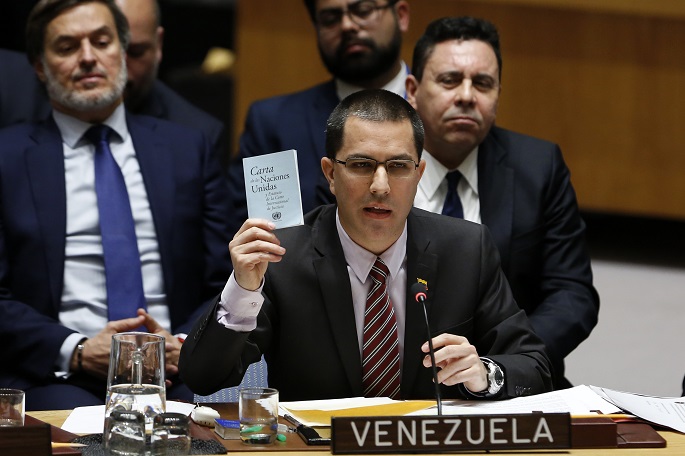UNSC divides over solution for Venezuelan crisis
Published : 27 Feb 2019, 12:45
The Security Council on Tuesday debated over the political and humanitarian crisis in Venezuela, with different opinions on how to resolve the Venezuelan impasse.
Jorge Arreaza, Venezuela's Minister of the People's Power for Foreign Affairs, called upon the council to adopt a resolution rejecting the use of force, or the threat of such use, against his country, during a meeting attended by nearly 40 member states of the UN.
The Under Secretary General for Political and Peacebuilding Affairs, Rosemary DiCarlo, said in her briefing to the council that the situation in Venezuela has been "an alarming escalation of tensions," and the humanitarian crisis is scaling up.
"Venezuelan actors across the political spectrum have the responsibility to put the interests of the Venezuelan people at the center of their actions at this most critical time," DiCarlo said.
Elliott Abrams, the special representative for Venezuela of the United States, whose delegation requested the meeting, said that the United States and many other countries call for humanitarian assistance for Venezuelans.
"The people of Venezuela need our solidarity and help," he said.
A U.S.-backed drive to deliver "humanitarian aid" to Venezuela through border crossings on Feb. 23 met strong resistance from the Venezuelan government as President Nicolas Maduro believed the aid, mainly from the United States, is a smokescreen for a military invasion.
The Venezuelan government has closed borders with Brazil and Colombia and some air and sea routes.
Russian representative Vassily Nebenzia said Venezuela's people must resolve their own problems through solutions based on respect for national sovereignty.
What occurred on the Colombian border on Feb. 23 was not an attempt to deliver aid, but to breach the frontier of an independent State, he said.
According to DiCarlo, on Feb. 23 the Venezuelan authorities blocked entry of trucks which led by Juan Guaido, head of the Venezuelan National Assembly, on borders with Brazil and Colombia.
Arreaza said it is fitting for the council to address the international aggression faced by his country's people. "Without a doubt, such aggression threatens regional and international peace and stability," he added.
He also criticized DiCarlo's briefing as biased. Venezuela's government is now waiting to sit down with the opposition to decide the country's future without interference from anyone, most of all the United States, he added, expressing hope that the White House will give Guaido its approval to begin talks.
Ma Zhaoxu, China's permanent representative to the UN, said that China opposes military intervention in Venezuela.
"China opposes using the issue of so-called humanitarian assistance for political purposes to create disability or even turbulence inside Venezuela and in the neighboring region," said Ma.
The governments which tried to deliver humanitarian aid are the same ones exerting pressure for regime change, said Cuba's representative Ana Silvia Rodriguez.
Reaffirming Cuba's support for Maduro, she stressed that peace and security in Latin America must be defended and upheld.


